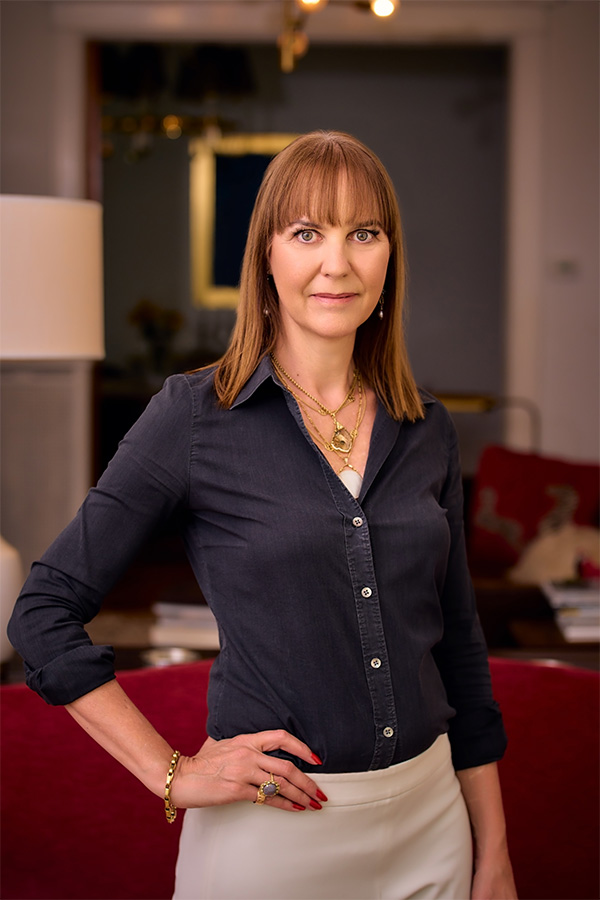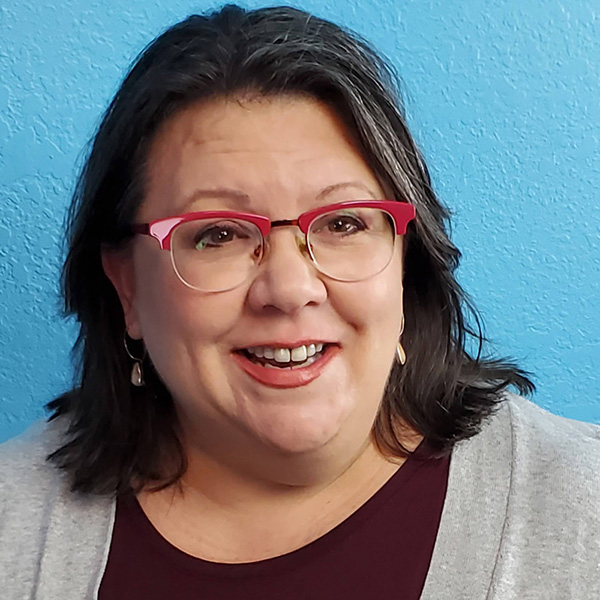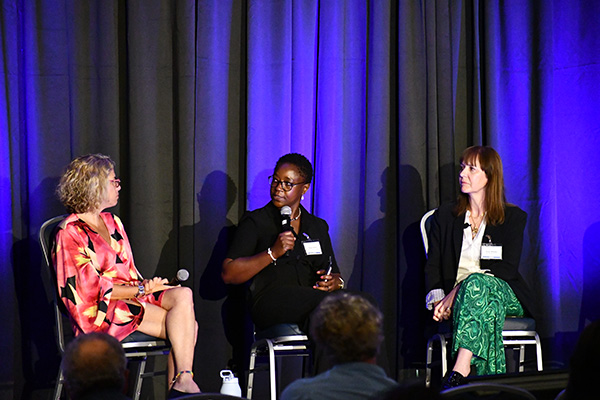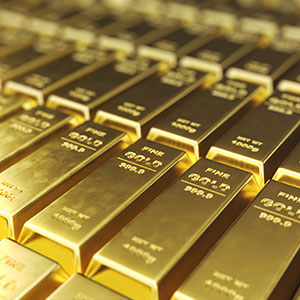
For two days in mid-August, 135 people—including members of the jewelry industry as well as stakeholders from governments, nongovernmental organization (NGOs), and producing countries—grappled with some of the jewelry trade’s thorniest issues at the seventh annual Chicago Responsible Jewelry Conference. The event took place on the eve of the InStore Show at the Donald E. Stephens Convention Center in Rosemont, Ill., a suburb of Chicago near O’Hare International Airport.
Conference founder Susan Wheeler of Susan Wheeler Design, and Andrea Hill, CEO of Hill Management Group, which markets and produces the conference, spoke to JCK about the topics that drew the most attention this year, how the United Nations 17 Sustainable Development Goals (SDGs) framework helps guide the event, and why anyone seeking a deeper understanding of the sustainability issues affecting the jewelry industry should commit to attending next year’s conference, scheduled for Aug. 9–10, 2024, at the same location.


“What we cover changes a lot every year,” Wheeler says. “It’s never stuck in a 101 phase. If you look at it as a college syllabus, we continue to go more in-depth, deep-diving into all areas of the jewelry industry supply chain and also connecting with people all over the world.”
Susan, what’s changed about the conference in the years since you founded it?
Susan Wheeler: In the beginning, it was the only conference fully around responsible sourcing and it has stayed true to elevating voices in all stages of the value chain, the miners, or anyone throughout. If there are topics we touched on two years ago—water issues in mining, for example, or use of mercury—we’ve talked about them later and this year, we just had a panel on deep sea mining. It’s about that continuation and going deeper.
Andrea, who is the audience and how has it changed over the years?
Andrea Hill: The audience hasn’t changed that much. We’re on track with our original goals: to get the industry, NGOs, government, and producers all together in one place.
One of the things you’ll see with other industry forums is that it’s always the industry talking to itself.
We get vital information from the Jewelers Vigilance Committee, but the Chicago conference is the only one that puts industry, NGOs, governments—such as representatives of African mining leadership—and source producers all together. I’d be lying if I said that the industry representation at the conference is what it needs to be, but we do see tremendous partners step up and lend their support.
What about retailers?
Hill: We see very little retail participation and that last mile is where we need to get more involvement—particularly because the retailers can answer consumers’ questions. Consumers are bringing more and more questions about sourcing and responsibility and retailers need to have knowledge beyond the sound bites, beyond basic brand talking points. Retailers need to be more informed. But also, like Bob Goodman of Robert Goodman Jewelers in Zionsville, Indiana, they can bring the conversation to the consumers.
What was new this year in the way of topics and conversations?
Wheeler: Responsible silver was new. We’ve had retailers speak before—Anna Bario, co-founder of Bario Neal, did a nice presentation. She does her own sustainability report and she presented about that.
Hill: Some of the scientific focus was new. We had a near-shore mining presentation in a prior year but this year was about looking at deep-sea mining.
Wheeler: Saleem Ali [distinguished professor of geography and a member of the U.N. International Resource Panel at the University of Delaware] talked about migration. That was a new topic. There are a lot of people out there who think in that global way: how the minerals we use affect things on a global scale.

The conference has been centered on the SDGs [the United Nations 17 Sustainable Development Goals] for the past five years. I’m a big believer in that framework for everything I do in the conference. That was this year’s underlying thread. That along with the phrase Let’s protect the industry. My feeling is that we need to look at all issues in the industry and not push them under the rug. We need to be proactive.
Also, protecting the industry is looking at deep-sea mining. We want to be on the forefront of this to protect the industry. We don’t want to be looked at five years from now, with people saying, “Oh my God, is the gold in my bracelet from deep-sea mining?” Years ago, the indigenous community in Papua New Guinea voted against deep-sea mining, and that was a huge victory. It’s important for us to understand deep-sea mining and the implications.
With regards to deep-sea gem mining, did the conference focus on smaller players or big names in mining?
Hill: There’s no responsible way to mine the ocean yet because scientists don’t have enough information to know what the impacts would be. They recognize there are tremendous threats to global food systems but they can’t quantify it yet.
When we disrupt these ecosystems, we do damage; we just don’t know what it is yet. Scientists are saying, “Just hold off.” There’s very good science to suggest that we’ll create problems if we start mining the seas, so the question is: Do we have to? Other than making a select group of players much wealthier than they already are, there’s no real reason to do it. So let’s hold off.
Which topics garnered the most attention at this year’s event?
Hill: The deep-sea one really shook people up—when you listen to a scientist from the Scripps Institution of Oceanography explain what’s really happening. That and the session on Marange women.
Wheeler: We did a session on sex trafficking in the Marange [diamond-mining] region of Zimbabwe with the nonprofit Marange Women’s Alliance. One of the women now lives in exile in the U.K. It was the first chance for many people to hear firsthand how sex trafficking is working within the diamond mines and the syndicate they have and how women are used as tokens to get into the mines.
Hearing that firsthand and understanding the scope of trafficking and the vulnerability of the women, and how the speaker, Abby [Abigail Sibanda], now isn’t safe to go back to her community—I think everybody is truly getting an understanding of what’s happening there.
When people visit Marange, these things are hidden from them. That was a really hard topic to hear, but important. And there was money raised—about $7,300—for women in Marange to have chicken coops. That was a spontaneous thing.

How many women are in the alliance?
Wheeler: There are 100 women in the alliance. They live within the Marange concession. It’s a militarized zone. One of the things the alliance does, funded through jewelers, is they fund a data plan for all 100 women so they can communicate. It’s very dangerous for the women to travel. So the data allows them to get on the weekly phone call using WhatsApp, which are like mini knowledge-building conferences, and have peer-to-peer communications.
Maybe about a year and a half ago, the women’s alliance tried to change the norms around sex trafficking. Many of the women are survivors, and are seen as the most vulnerable women in their community. After a year and a half of support and intervention, they did an STD clinic. When Abby came to speak in Chicago, we could give a full scope of how it’s working.
What were your personal highlights from the conference?
Wheeler: For me, it was that one, because it’s been such a big part of my nonprofit work. I even said to Andrea, “Maybe people don’t want to hear about the Marange Women’s Alliance this year?”
Hill: And what did I say?
Wheeler: That sometimes people need to hear things more than once.
Hill: For me, the highlight was a thought process. Saleem Ali was there speaking on migration. He’s a systems scientist. In an onstage conversation with him, he talked about the fact that there’s no such thing as a perfect solution to anything. That everything we do comes with consequences. We all know that’s true: You go for utopian solutions and you never get there. But helping the audience recognize that seeking perfection is not even a rational goal. That we should fixate on forward motion and trying to do the most good. It’s such an important thought process for people to be exposed to.
To understand that perfection isn’t your goal but progress is vital, and so is tying it into the U.N. SDGs. They’re not about perfection, they’re about progress across 17 different categories. People sometimes use the excuse of “How can I alone change things?” to not get involved. But that’s a red herring. Pick something and do something. And that talk with Saleem really helped.
What were the biggest calls to action that came out of the event?
Hill: Get involved, pay attention. It goes back to this thing with retailers not participating.
They’re saying, “What can I do? I can’t turn my whole store into responsible merchandise overnight.”
The first thing you can do is learn more about it. If you were going to learn to fly an airplane, you’d study weather, not because you plan to become a weather forecaster. If we don’t understand the weather, we can’t be better pilots. If we don’t understand the whole context of the jewelry supply chain, we can’t be better business practitioners. I wish people would dig deeper than the sound bites. Next year, bring two friends, share that information, pay attention. The Chicago Responsible Jewelry Conference helps you do that.
Wheeler: For me, it’s in two parts: Understand the context of the jewelry industry. Let’s look at the fact that it perpetuates poverty and let’s change that. We rely too much on the larger mining actors doing their corporate responsibility projects, but that won’t help us attain any goals with the SDGs. Anyone can take a little action. We’re not doing enough.
The fashion and apparel industry is leaps and bounds ahead, doing all these little initiatives. I don’t see a lot of jewelers just doing something, whether it’s employing a migrant, or planting a tree when you buy a gem. We need real action.
Top: The Donald E. Stephens Convention Center in Rosemont, Ill. (photo courtesy of the Village of Rosemont)
- Subscribe to the JCK News Daily
- Subscribe to the JCK Special Report
- Follow JCK on Instagram: @jckmagazine
- Follow JCK on X: @jckmagazine
- Follow JCK on Facebook: @jckmagazine






